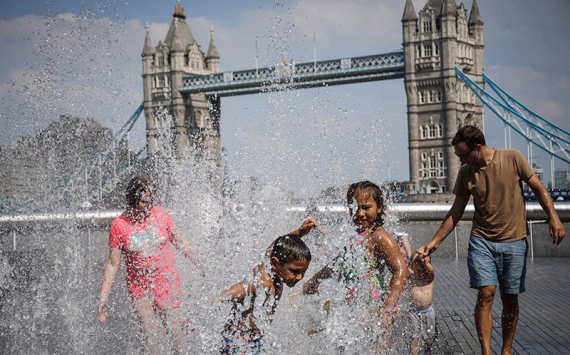
London could run out of water within 25 years and British rivers could lose more than half their water by 2050 as cities around the world face growing risks from drought driven by the climate crisis, according to a report from Christian Aid.
The charity has warned that the situation is increasing the severity of drought in 10 of the world’s major cities – from London to New Delhi, and Sydney to Kabul. It says that without cutting greenhouse gas emissions and improving management of fresh water the toll will be felt most acutely by the world’s poorest inhabitants.
The charity is calling for an international fund to pay for loss and damage from climate impacts.
Despite covering more than 70 per cent of the earth’s surface, only 3 per cent of the world’s water is suitable for drinking, and most of that is locked up in glaciers and ice caps.
Less than 0.01 per cent of the world’s fresh water is available for human use in lakes, rivers and reservoirs. Despite this, the charity found that global water use grew at more than twice the rate of population increases over the course of the 20th century.
Water shortages are already being felt across the world. Cape Town came within days of becoming the first major city to run out of water in 2018, and people have been queuing for water in New Delhi where temperatures have soared in recent weeks .
Even London and the southeast of England could run out of water within 25 years, according to James Bevan, CEO of the Environment Agency. The cost of a severe drought to London’s economy is estimated by Thames Water to be £330m per day, and would have severe economic, social and environmental consequences, the report says.
The Environment Agency has said that by 2050 some rivers will see 50 to 80 per cent less water during the summer months.
London already receives around half the amount of rain that falls in New York City, according to the report, and the climate crisis will increase the frequency and intensity of droughts in southeast England. Combined with a growing population, this could place serious stress on London’s ageing water supply system, the study says.
But it is the poor who will suffer the most. Some 55 per cent of the world’s population lives in urban areas, but this is set to rise to 68 per cent by 2050.
The UN has warned that lower-income city residents can pay up to 50 times more for a litre of water than their wealthier neighbours because they often have to buy from private vendors.
Cities in poorer countries are also far more vulnerable than those in richer countries as they have fewer resources to adapt to the water shortages, the report says.
Polling for the charity shows that just over a third of the UK public believe rich countries should pay to mitigate the impact of drought.
Almost half of adults across the UK – 49 per cent – are now concerned about the impact of drought, and more than 60 per cent agree that they have never seen information about how to protect themselves from it, according to the polling.
Nushrat Rahman Chowdhury, one of the authors of the report, said the intensity and frequency of drought have increased over the past 30 years due to global heating.
“It threatens lives and livelihoods of some of the poorest people in the world,” she said. “These are communities which have done the least to cause the climate crisis.”
She said the world not only needs to cut emissions but must also provide financial support, adding: “That is why, at this year’s UN climate talks in Egypt, we are calling for the creation of a loss and damage finance facility to be a major priority.”
Friederike Otto, a senior lecturer in climate science at the Grantham Institute, Imperial College London, said greenhouse gas emissions have caused rainfall patterns to change and temperatures to increase, making drought more common and more severe in parts of the world.
“Until net greenhouse gas emissions are halted, the risk of drought threatening cities’ water supply will keep growing,” she said.
Source: https://www.independent.co.uk/climate-change/news/london-water-drought-climate-change-b2079811.html




